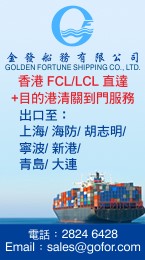|
Today's e-news sponsored by :
|
|
Powered by HKSG GROUP
|
|

|
|

|
|
The Leading Maritime & Transport News Portal
|
Wednesday, March 26, 2025
|

(Click on the above banner to know more)
|
|
|
|
|
|
|
|
Geo-political volatility affects shipping worldwide
THE global ocean freight market is undergoing a period of transition in 2025, influenced by regulatory changes, shifting trade patterns, and evolving carrier alliances, reports the UK's Birmingham's Metro.
While demand remains strong in key regions, rate volatility persists due to supply chain disruptions and excess capacity.
The ocean freight sector is experiencing considerable adjustments as carriers adapt to regulatory and economic shifts. The EU ETS expansion now covers 70 per cent of maritime emissions, leading to higher surcharges and operational costs for carriers.
Capacity growth is projected to slow to five per cent in 2025 after record vessel deliveries in 2024. However, supply chain disruptions persist due to global port congestion and ongoing Red Sea diversions are soaking up excess capacity.
The restructuring of major shipping alliances is further shaping the industry landscape, with the dissolution of 2M, the formation of the Premier Alliance by THE Alliance, and the launch of Gemini Cooperation in February 2025.
Proforma scheduled liner capacity on the Asia-North Europe trade is set to be reduced by around 11 per cent once the transition to the new shipping alliance set-up is complete.
The combined weekly capacity drop of some 28,000 TEU equates to a total reduction of 221,000 TEU across all services. However, the number of individual weekly sailings between Asia and North Europe is expected to increase from 26 (under the previous alliances and standalone services) to 28, potentially improving frequency and flexibility for shippers.
Expectations that Red Sea diversions would ease, returning an estimated two million TEU to global circulation, were dampened following missile exchanges between the US and Yemen's Houthi rebels.
Said MSC chief executive Soren Toft: "Suez simply isn't safe to transit at the moment, and there's no immediate prospect of a return. This continued instability may prolong disruptions and return pressure on rates."
Meanwhile, the Shanghai Containerised Freight Index (SCFI) has dropped 17 per cent since January and despite strong cargo demand in select regions, the market remains vulnerable to downward pricing pressures.
Demand remains resilient but uneven, with North America and India seeing stronger performance, whereas Europe's slower economic growth is weighing on export activity. Chinese exports have exceeded expectations, driven in part by early shipments ahead of potential tariff adjustments.
The Drewry World Container Index (WCI) has reached its lowest level since January 2024 and while rates are below their pandemic-era peaks they are still 79 per cent higher than pre-pandemic averages from 2019.

|
|
Work to begin in May on US$1.3b London Gateway expansion
DP World reports that it is poised to begin work in just a matter of weeks on a planned expansion of its London Gateway, a GBP1 billion (US$1.3 billion) project which when completed will add 50 per cent capacity to the UK's logistics sector.
Work is due to start in May and DP World said it will take four years to complete the expansion, reports Fort Lauderdale, Florida's The Maritime Executive.
The project will add two further 400-metre (1,300-foot) all-electric berths and a second rail terminal.
It follows recent investments in new cranes and logistics capabilities. The expanded container port, part of the Thames Freeport, will be able to accommodate six of the world's largest container ships, which will be served by Europe's tallest quay cranes.
DP World worked to gain regulatory approval for the investment, which was first announced in October 2024.
Last week, the chairman of DP World Sultan Ahmed bin Sulayem hosted the UK Minister of State for Investment, Baroness Poppy Gustafsson, at London Gateway to discuss the investment, growth plans, and 400 new permanent jobs that will be created at the logistics hub.
"This investment enhances London Gateway's position at the heart of British trade, creating new capacity and new connections between the UK and the global economy," said Sultan Ahmed bin Sulayem.
"DP World has invested more than GBP5 billion in its UK operations, providing more than 5,500 jobs, and is proud to be supporting national economic growth by enabling businesses to thrive and increasing resilience in the supply chain."
The start of construction follows the agreement between DP World and the Gemini Cooperation (Maersk and Hapag-Lloyd) for Gemini's Asia-Europe and Middle East-Europe services to call at London Gateway.
The first ship arrived at London Gateway last week following DP World Southampton welcoming its first ship under the Gemini Cooperation on February 3. The cooperation is focusing on the DP facilities moving these routes to Felixstowe as Genimi seeks faster port turns and 90 per cent schedule reliability.
"DP World's expansion in London Gateway will turbocharge the UK's logistics sector and help deliver the long-term, stable growth that supports skilled jobs and raises living standards across the UK," said Baroness Poppy Gustafsson, Minister of State for Investment.
"The UK is open for business and DP World's major investment is the latest vote of confidence in our economy, delivering economic growth and showing our Plan for Change is working."
The company reports the project will create over 1,000 construction jobs, plus 400 permanent new jobs at the port.

|
|
What the EU demands of shipping and shippers this year - 2025
TO meet the EU Sustainability Reporting Directive (CSRD) this year - 2025 - shipping companies, freight forwarders and shippers must align themselves with sustainability reporting requirements.
Companies must first assess whether they fall under the CSRD's scope. This includes businesses with more than 250 employees, and revenues of more than EUR40 million (US$44.6 million) and assets of EUR20 million.
Shipping companies must calculate their CO2 emissions, which includes greenhouse gases like methane and nitrous oxide. This involves tracking emissions from fuel consumption, cargo operations, and logistics.
The CSRD also requires companies to report on their environmental, social, and governance (ESG) performance using the ESRS (European Sustainability Reporting Standards) framework. This includes disclosing risks, impacts, and mitigation strategies related to climate change.
The ESRS aligns with international frameworks like the Global Reporting Initiative (GRI) and the International Sustainability Standards Board (ISSB) to reduce duplication and ensure global interoperability.

|
|
Containers swept overboard from MSC ship in storm off Portugal
AN MSC-operated containership lost some of its cargo in a storm while underway in the Atlantic Ocean off the coast of Portugal.
The Portuguese-flagged 4,432 TEU MSC Houston V was on its way from Piraeus in Greece to Liverpool when it encountered rough seas and wind gusts of up to 48 knots as Storm Martinho hit the waters off Cape St Vincent.
At least 15 containers were lost overboard when the vessel suffered a partial stack collapse, and many others were damaged or hanging off the starboard side.
The 266-metre-long ship, built in 2010, was forced to make an urgent stop at the port of Vigo in Spain, reports Singapore Splash 247.
It was berthed at the Termavi Terminal while the port authorities developed a plan to reposition or remove the containers safely.
The port authority said that the terminal has removed the cranes from the area and will deploy a mobile crane to ensure the safety of the stevedores and the terminal itself at all times.
"At this time, it is unknown how long the operation will last. Safety plans and logistics are currently being worked on. The important thing is that the ship is in port and there is no risk to navigation, and especially to fishing vessels due to the vessel's size," noted Carlos Botana, president of the Vigo Port Authority.

|
|
Canada spends US$4.5b to build two polar icebreakers
CANADA's Ministry of Public Services and Procurement early this month awarded two construction contracts worth a total of CAD6.4 billion (US$4.5 billion) for two polar icebreakers that are being built for the Canadian Coast Guard.
On March 7 came the announcement of a CAD3.15 billion contract to Seaspan's Vancouver Shipyards for one of the two icebreakers, reports New York's MarineLog.
The next day came the official announcement of a CAD3.25 billion award to Chantier Davie Canada Inc for the other.
Chantier Davie will deliver the ship from its Levis, Quebec, shipyard. To accelerate its production, Davie will also leverage its Canadian-owned shipyard in Finland, Helsinki Shipyard, where construction will start.
"With Finland's unique expertise and track record building polar icebreakers, this will deliver Canadian ships faster and cheaper, and get them on the ice quicker," said the Public Services and Procurement Canada announcement.
The Seaspan polar icebreaker will be built entirely in Canada at Seaspan's Vancouver Shipyards, located in North Vancouver, British Columbia.
With the contract now in place, Seaspan is ready to cut steel on this ship and begin full-rate construction on Canada's newest vessel under the National Shipbuilding Strategy (NSS). Construction of this ship will support the work of a team of more than 1,000 local shipbuilders and a broad Canadian supply chain of over 800 Canadian companies.
The new polar icebreaker will be the seventh vessel designed and built by Seaspan under the NSS. It will also be the fifth Polar Class vessel to be built for the CCG, and one of up to twenty-one icebreaking vessels overall that Seaspan is constructing.
Functional design of the polar icebreaker was completed in 2024 by Seaspan, prior to the start of construction. For this ship, Seaspan worked extensively to build out the largest marine design and engineering team in Canada, which includes Seaspan employees and Canadian partners, while simultaneously working alongside established Finnish companies that have extensive experience in designing Arctic-going vessels.
Davie says that it will deliver its Polar Max design icebreaker to Canada by 2030. Created by the Helsinki Shipyard, the Polar Max design is based on Aker Arctic's original Aker ARC 148 hull form.

|
|
China delays BYD Mexico auto plant approval
BEIJING is delaying approval for carmaker BYD to build a plant in Mexico amid concerns that the smart car technology developed by China's biggest electric-vehicle maker could leak across the border to the US, reports London's Financial Times.
BYD first announced plans for a car plant in Mexico in 2023, along with intentions to make cars in Brazil, Hungary and Indonesia. It said the Mexican plant would create 10,000 jobs and produce 150,000 vehicles a year.
But domestic automakers require approval from China's commerce ministry to manufacture overseas and it has yet to give approval, according to two people familiar with the matter.
Authorities feared Mexico would gain unrestricted access to BYD's advanced technology and knowhow, they said, even possibly allowing US access to it. "The commerce ministry's biggest concern is Mexico's proximity to the US," said one of the people.

|
|
FedEx orders 18 freighters as Q3 revenues improve
EXPRESS giant FedEx has announced the order of eight Boeing 777 freighters and ten ATR 72-600 turboprops as third-quarter profits and revenues both improved.
In an investor release, the company said that in March 2025 it had exercised options to purchase an additional eight 777F aircraft as part of its fleet modernisation programme.
Three of the aircraft are expected to be delivered in 2026 and the remaining five in 2027. It also agreed to purchase a further two of the model earlier in the quarter, reports London's Air Cargo Week.
Meanwhile, the company said it would also extend the retirement of the entire Boeing MD-11 fleet from 2028 to the end of 2032. It had been gradually phasing out the aircraft to replace them with more fuel-efficient models, such as the 777F.
In total, FedEx currently operates fifty-seven 777 freighters and has a further 11 on order, including the 10 mentioned above. Its MD-11F stands at 37 aircraft.
Elsewhere, ATR today announced that FedEx has ordered ten ATR 72-600 turboprop freighters to add to its existing order of 30 of the aircraft.
FedEx's third quarter financial performance running to February 28 showed that revenues increased by 2.3 per cent year on year to US$22.2 billion, operating income improved by 4 per cent to $1.3 billion and net income was up 3.4 per cent to $910 million.
"The FedEx team delivered improved profitability while navigating a very challenging operating environment, including a compressed peak season and severe weather events," said Raj Subramaniam, FedEx Corporation president and chief executive.

|
|
Cathay Cargo Terminal attains Asia's first IATA SeMS certification
HONG Kong's Cathay Cargo Terminal reached a notable milestone last week, becoming Asia's first ground-handling facility to achieve the International Air Transport Association (IATA) Security Management System (SeMS) certification at the highest initial accreditation level - Operating Status.
This accomplishment reinforces Hong Kong's global leadership position in air cargo logistics and sets a new benchmark for aviation security management in Asia.
The IATA SeMS certification is awarded to organisations that demonstrate exceptional proficiency in proactively managing aviation security risks, regulatory compliance, and continuous improvement in response to evolving threats.
By implementing the structured SeMS framework, Cathay Cargo Terminal emphasises a data-driven, risk-based approach, actively addressing vulnerabilities to ensure the highest levels of operational security.
Cathay Cargo Terminal's COO, Mark Watts, emphasised the critical role of security in air cargo operations. He highlighted recent investments in advanced security technologies, including artificial intelligence-based systems for intruder detection and unattended cargo monitoring, as well as comprehensive cybersecurity enhancements.
According to Mr Watts, achieving the prestigious SeMS certification reflects the terminal's unwavering dedication to safeguarding customer equipment, cargo integrity, and sensitive data.
Nick Careen, IATA's Senior vice president for Operations, Safety, and Security, commended Cathay Cargo Terminal for embedding SeMS principles into its core operational strategy.
He noted that this certification represents a significant advancement in aviation security practices, supporting broader industry-wide objectives to enhance security measures through continuous improvement and collaboration.
Cathay Cargo Terminal will formally receive its SeMS certification during the upcoming IATA World Cargo Symposium in Dubai on April 15, 2025, according to London's Air Cargo Week.

|
|
MSC Air Cargo selects HAECO for line maintenance in Hong Kong
HONG Kong Aircraft Engineering Company Limited (HAECO) has entered a new agreement with MSC Air Cargo to provide the air freight company line maintenance at Hong Kong airport.
MSC Air operates six weekly flights out of Hong Kong; four weekly flights to Milan, and one weekly flight to Liege and Chicago. The carrier tells New York's Aviation Week it carries a range of commodities, including perishables, fashion items and automotive shipments to Hong Kong.
Known as a major shipping line, MSC created the air cargo unit in 2022 to complement its shipping business and now flies five Boeing 777-200LRFs.
In Asia, MSC Air also flies to Erzhou, and Xiamen in China, Tokyo-Narita and Singapore.
"By leveraging HAECO's industry-leading capabilities and expansive line services footprint both in Hong Kong and the Chinese Mainland, we look forward to becoming a trusted partner to MSC Air as they continue to expand their competitive cargo solutions," HAECO CCO Gerald Steinhoff said.

|
|
Finnair, DB Schenker to reduce carbon emissions
FINNAIR has set a target to reduce its carbon emissions intensity by 34.5 per cent by 2033 from a 2023 baseline, reports Mumbai's STAT Trade Times.
Together, Finnair and DB Schenker have initiated their sustainability collaboration by signing an agreement. For DB Schenker it is a commitment to purchase nearly 400 tonnes of scope 3 CO2e reductions, equalling approximately 120 tonnes of sustainable aviation fuel (SAF) from Finnair.
"Both companies are committed to increasing the use of SAF to reduce the greenhouse gas (GHG) emissions related to air cargo transport. SAF can reduce greenhouse gas emissions by up to 80 per cent over the fuel's life cycle compared to using fossil jet fuel," says a release from Finnair.
Finnair has set a science-based target to reduce its carbon emissions intensity (CO2e/RTK) by 34.5 per cent by 2033 from a 2023 baseline and is aiming towards net-zero emissions by 2050, the release said.
"Our tool kit for reaching the target comprises investing in sustainable aviation fuels beyond regulatory requirements, further improving operational efficiency, optimising our network and investing in new aircraft technology," says Finnair Cargo chief Gabriela Hiitola.
"This agreement with DB Schenker marks an important milestone in our decarbonisation efforts, and we are thrilled to partner with such a pioneering company, placing key focus on this important matter," she said.

|
|
|
|
|

|
Copyright 2025 HKSG Group Media Ltd. All rights reserved.
|









